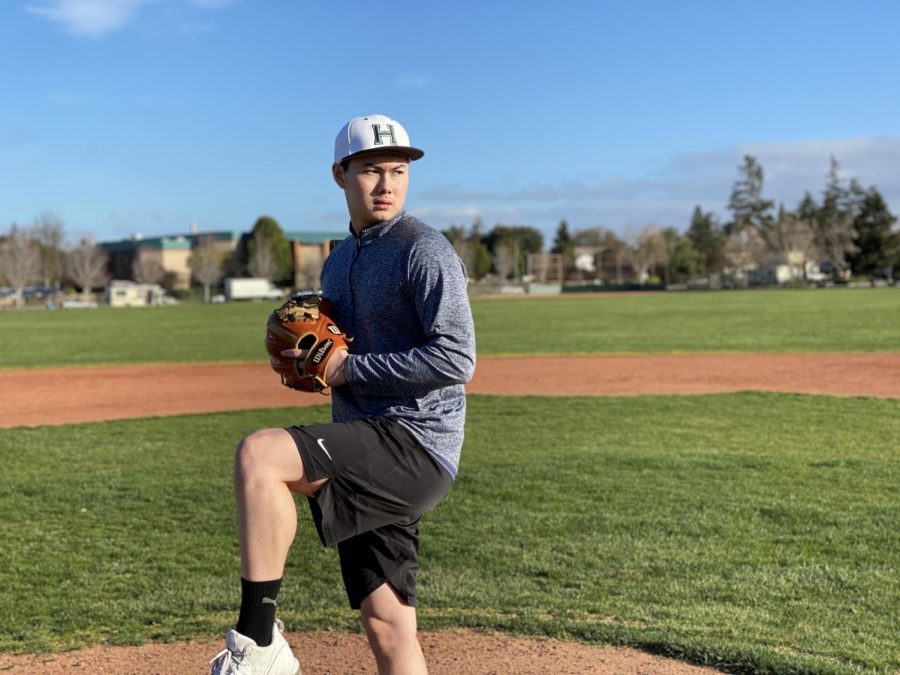Humans of Harker: Pitching with intent
Andrew Chavez enjoys playing baseball and volunteering to inspire and help others
“If you focus, concentrate and control your emotions, it could be helpful in any discipline, whether it be school or baseball, or even volunteering for that matter. As long as you focus, put your mind to it and have that drive for it, things will happen better than how they would have been if you just sat there,” Andrew Chavez (12) said.
With the ball in one hand and a large brown baseball mitt in the other, Andrew Chavez (12) stands at the pitcher’s mound, his eyes on his target. Hands clenched together, he brings one knee up and stretches his arm back. Finally, Andrew takes a deep breath in and steps forward, launching the baseball in front of him.
Andrew has been playing baseball for 14 years, and through playing competitions in different locations across California, he has learned how to adapt to certain situations and environments.
“It is really inspiring to see how people can come from all across the country or even the state [to play in these tournaments],” Andrew said. “On that field, maybe it’s something you’re not used to, there might be some conditions that you’re not used to, it might be warmer than it usually is here, and stuff like that, so you have to adapt.”
Andrew’s enthusiasm for baseball is what drives him to become a better player. Mike Delfino, coach of the boys baseball team, has noticed Andrew’s passion for the game since meeting Andrew in his freshman year.
“He’s got a tremendous passion for the game. He can be fiery in a good way. He controls his emotions, and he’s competitive, [which] serves him well,” Delfino said. “He really works hard within himself, and he tries to get better and does a really nice job getting better on his own … He’s always looking to get better. He’s never satisfied.”
In baseball, one principle that Andrew lives by is learning from past experiences and being able to apply that knowledge to future situations. For Andrew, it is valuable to make sure similar situations don’t happen again.
“Some tragic moments might have happened, whatever it may be, [but] you want to learn,” Andrew said. “It’s more important to, instead of forgetting about [that moment] and striving on [to] what you’re going to do next, you want to look back and say, ‘Okay, before this moment, what happened? What could I do better in this situation?’ and hopefully try to either not make that mistake again, or learn from it.”
Off the field, Andrew spends his time practicing the trombone, which he has been playing for seven years. Andrew finds a connection with music that allows him to express himself through solos and pieces.
“Music is a language that you can use,” Andrew said. “When I’m at home or in jazz band, my friends and I will play something random, and we’re fooling around, but we’re also expressing ourselves. If we’re feeling particularly down [on] a specific day, we’ll try to play some cheery song that will uplift our feelings.”
Andrew also uses music to get into the zone before a baseball game. By listening to any type of music, it allows him to focus his brain and get in the mindset to win.
For the past four years, Andrew has also been spending his time volunteering at the Sunday Friends Foundation, where he holds activities for low-income children and families in south San Jose for them to earn credit for basic resources such as food and school supplies.
“Volunteering has opened my mind and taught me that you have to be able to do something and show effort to get what you want or need,” Andrew said. “It’s really memorable and inspiring for me, and it motivates me to help people out more.”
Volunteering has also helped Andrew to develop a growth mentality based on a healthy work ethic, allowing him to improve in many of the aspects of his life including baseball and school.
“If you focus, concentrate and control your emotions, it could be helpful in any discipline, whether it be school or baseball, or even volunteering for that matter,” Andrew said. “As long as you focus, put your mind to it and have that drive for it, things will happen better than how they would have been if you just sat there.”
This mindset has been especially helpful in baseball, where Andrew leads and earns the respect of his teammates. Delfino observes the influence that Andrew has on his fellow teammates.
“[One of Andrew’s strengths is] certainly his work ethic. He leads by example,” Delfino said. “He doesn’t say a lot, but when he does, his teammates listen, because he has such a great work ethic and he works so hard … That rubs off on some of his teammates.”
Whether it be in baseball or music, Andrew consistently works on improving. Aniket Kriplani (12), who has known Andrew since the fourth grade, has noticed Andrew’s humility and work ethic.
“[Andrew] is generally very laid back, and he’s passionate and humble, and he doesn’t show off much. He puts a lot of time into the things he does and gets really good at them, yet he doesn’t really flaunt that much. He’s very, very committed to the things he does,” Aniket said.
The well-being of Andrew’s friends and the people around him is also an important value of his. Andrew credits his friends with helping him become more social and extroverted and encouraging him to venture outside of his comfort zone.
“[My friends have] really helped me ease out more and spread myself outwards [in] helping other people, whether it be people in need or people not in need, [like] saying ‘hi’ to strangers, who look like they’re feeling down [and] brightening their mood. It’s pretty important to me [that] everyone should feel happy,” Andrew said.

Alena Suleiman (12) is the co-editor-in-chief of Harker Aquila, and this is her fourth year on staff. Alena wishes to interact with new people and work...

Sally Zhu (12) is the co-editor-in-chief of Harker Aquila, and this is her fourth year on staff. This year, Sally wishes to interview more people around...

Nicholas Wei (11) is the managing editor of Humans of Harker. During his third year on staff, Nicholas looks forward to bonding and working with the cubs...


















![“[Building nerf blasters] became this outlet of creativity for me that hasn't been matched by anything else. The process [of] making a build complete to your desire is such a painstakingly difficult process, but I've had to learn from [the skills needed from] soldering to proper painting. There's so many different options for everything, if you think about it, it exists. The best part is [that] if it doesn't exist, you can build it yourself," Ishaan Parate said.](https://harkeraquila.com/wp-content/uploads/2022/08/DSC_8149-900x604.jpg)




![“When I came into high school, I was ready to be a follower. But DECA was a game changer for me. It helped me overcome my fear of public speaking, and it's played such a major role in who I've become today. To be able to successfully lead a chapter of 150 students, an officer team and be one of the upperclassmen I once really admired is something I'm [really] proud of,” Anvitha Tummala ('21) said.](https://harkeraquila.com/wp-content/uploads/2021/07/Screen-Shot-2021-07-25-at-9.50.05-AM-900x594.png)







![“I think getting up in the morning and having a sense of purpose [is exciting]. I think without a certain amount of drive, life is kind of obsolete and mundane, and I think having that every single day is what makes each day unique and kind of makes life exciting,” Neymika Jain (12) said.](https://harkeraquila.com/wp-content/uploads/2017/06/Screen-Shot-2017-06-03-at-4.54.16-PM.png)








![“My slogan is ‘slow feet, don’t eat, and I’m hungry.’ You need to run fast to get where you are–you aren't going to get those championships if you aren't fast,” Angel Cervantes (12) said. “I want to do well in school on my tests and in track and win championships for my team. I live by that, [and] I can do that anywhere: in the classroom or on the field.”](https://harkeraquila.com/wp-content/uploads/2018/06/DSC5146-900x601.jpg)
![“[Volleyball has] taught me how to fall correctly, and another thing it taught is that you don’t have to be the best at something to be good at it. If you just hit the ball in a smart way, then it still scores points and you’re good at it. You could be a background player and still make a much bigger impact on the team than you would think,” Anya Gert (’20) said.](https://harkeraquila.com/wp-content/uploads/2020/06/AnnaGert_JinTuan_HoHPhotoEdited-600x900.jpeg)

![“I'm not nearly there yet, but [my confidence has] definitely been getting better since I was pretty shy and timid coming into Harker my freshman year. I know that there's a lot of people that are really confident in what they do, and I really admire them. Everyone's so driven and that has really pushed me to kind of try to find my own place in high school and be more confident,” Alyssa Huang (’20) said.](https://harkeraquila.com/wp-content/uploads/2020/06/AlyssaHuang_EmilyChen_HoHPhoto-900x749.jpeg)



